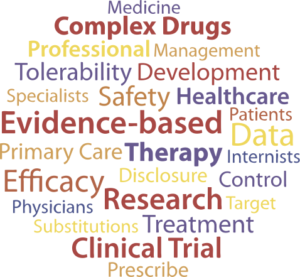The Role of AI in Clinical Trials

Artificial intelligence (AI) – based technologies are increasingly finding applications in multiple industries, including the pharmaceutical field. AI integration into drug development contributes to the enhancement of testing accuracy and efficiency, expedites the drug development process and optimizes overall outcomes. These advancements increase the probability of successful drug development and regulatory endorsements.
The utilization of AI tools in the drug development process holds the promise of shortening the time it takes for a drug to reach the market, ultimately affording patients more advanced and cost-effective treatment options. BioPharma Services is keeping a close eye on the evolution of AI in clinical trials, focusing on how AI can be incorporated into our business practices and help with the design, conducting and analysis of clinical studies.
Application of AI in Clinical Trials
Artificial Intelligence/Machine Learning (AI/ML) took the spotlight at the 2023 DIA Annual Meeting, showcasing the positive responses and rapid growth of using AI/ML within the realm of clinical trials and the broader pharmaceutical development industry. AI/ML continues to play an increasingly important role in clinical trials, revolutionizing the way drugs and medical treatments are developed, tested, and approved with diverse applications in many aspects.
Patient Recruitment and Eligibility
Among the general hurdles that exist in the setup and the conduct of a trial, recruiting participants remains a critical challenge. The impact of poor recruitment is known to be immense in terms of time and associated financial cost to the trial. Such recruitment challenges are due to many factors such as complex protocols, lack of awareness of the trial, emotional fears of participation and often just a lack of interest to participate.
AI in clinical trials may have a major role in this sense. AI-driven patient recruitment and eligibility solutions, such as chatbots and virtual assistants, can engage with potential trial participants, provide information, answer questions, and collect pre-screening data, enhancing patient engagement and adherence to the trial.
Trial Design and Protocol Development
AI solutions that can have the capacity to expedite and refine the process of generating and analyzing hypotheses, thereby enhancing our comprehension of the progression of diseases and advancing drug discovery. They can contribute to refining cohort composition, monitoring, adherence, and endpoint selection.
They can be educated to optimize clinical trial designs faster than human as they can correlate various factors, including patient demographics, treatment regimens, and endpoints, ultimately leading to more streamlined and cost-effective trials. Moreover, AI can propose adaptive trial designs, which allow modifications to the trial as more information unfolds, offering improvement in patient outcomes and overall study efficiency.
Data Collection and Safety Monitoring
Wearable devices and mobile apps incorporating AI can collect patient data remotely, reducing visit frequency for patients to clinical sites. This enhances patients’ convenience and engagement in trials. Additionally, the observed algorithmic evidence can be integrated into clinically practical consideration to improve medical care for patients.
Those mentioned devices processing with AI also allow remote safety monitoring in clinical trials, which can detect abnormal signals from the observed parameters and notify the medical monitoring at the very early phase. They also facilitate effective tracking, reviewing, and detecting the potential concern patterns from measurements throughout the study, allowing faster response and necessary interventions from medical monitors.
Regulatory Compliance
AI in clinical trials can streamline the regulatory compliance process by automating the documentation and reporting obligations, This reduces the risk of errors and expedites the approval process. Many agencies are welcoming AI/ML usage in clinical trials as an innovative discipline with broad applications and disruptive potential.
While there is evidence of international collaboration through a horizon-scanning initiative encompassing AI, it is noted that the European Medicines Agency (EMA) and the U.S. Food and Drug Administration (FDA) approach AI integration in healthcare differently.
In the EU, there is an ongoing effort to develop a broad regulatory framework for AI. In the US, the FDA appears to primarily focus on the qualification of AI tools, classifying them as Software as Medical Device (SaMD), without specific recognition of its potential use in clinical trials.
In May 2023, the FDA published a discussion paper outlining the current and future applications of AI/ML in drug development. This framework addressed core issues like human-led governance, data quality, and model development standards. It emphasized a risk-based approach tailored to specific contexts of AI/ML use in clinical trials, underlining the importance of accountability and transparency.
Challenges of AI in Clinical Trials
The use of artificial intelligence (AI) in clinical trials has the potential to revolutionize the drug development and healthcare industries, but it also raises several issues that need careful consideration.
Bias in Training Data
AI can be a promising tool for clinical trials because it could theoretically reduce bias by removing the human element. However, in some cases, AI can amplify human prejudices rather than avoid them.
Machine learning learns from data, and many records contain or reflect implicit, societally ingrained bias. Consequently, analyzing these records of AI in clinical trials can pick up on trends and train itself to act on them, exaggerating the prejudices within its data.
This bias problem can be challenging because AI learns from subtle things humans may not immediately recognize in data. Developers and end users must ensure they train clinical trial models on diverse data sets and actively monitor for and correct biased tendencies.
Data Privacy and Integrity
AI models require vast amounts of data to work reliably. Training health care AI may involve feeding it terabytes of medical records. Implementing one through AI in a clinical trial could put thousands of participants’ information in a single database to analyze. Having this much sensitive data in one place poses significant cybersecurity and privacy risks.
Many organizations also use “black box” AI, which makes it unclear how the model uses data. That means businesses running clinical trials may be unable to tell participants how they’ll use their information, creating an obstacle to informed consent.
Lack of Transparency and Liability
It’s not always clear how AI models work, and clinical trials using this technology may struggle to remain transparent. That lack of transparency can lead to hefty regulatory fines when clinical trials already cost $2.6 billion on average and infringe on participants’ right to information.
Using “black-box” AI in clinical trials makes it difficult to show how it reached its conclusions. Even if the device or drug passes regulatory hurdles with this lack of transparency, it poses an ethical concern. Trial participants should also be able to request and access information about what data the study collects and how it uses that information. Businesses may be unable to provide that transparency with some AI models.
Additionally, as many applications are new and relevant legal guidance is relatively sparse, the matter of liability is left up in the air. Building a proprietary AI model for clinical trials can cost millions of dollars, so many organizations opt for off-the-shelf or custom solutions from third-party vendors. As a result, the company using the AI isn’t always the one that built it.
Introducing more parties into the equation raises more liability questions. If something goes wrong during a clinical trial relying heavily on AI, who’s responsible for the failure and resulting damage? Is it the team that built the model, the model itself, or the company that deployed it? The lack of clear answers to these questions poses ethical risks to participants whom these mistakes would affect in case of integrating AI in clinical trials.
What the future holds for AI in clinical trials
Despite the concerns raised above, it does not mean it is too risky to use AI in clinical trials, but a strategic planning process must be prepared for such implementation. A proper risk mitigation plan should be mapped out to address all potential concerns before starting the project.
As a Phase 1 clinical trials oriented organization, BioPharma Services is always looking closely at how we can apply AI/ML to our business, identify which kind of integration could contribute to the aspect of our activities, to ensure that all activities are human-involved, and will not use anything that does not ensure that we are satisfied with the product.
Clinical trial AI requires considerable oversights, starting with short-term, partial adoptions in parallel with continuous validations. Optimal paths will emerge as more businesses are engaging in this path. Until then, medical companies should temper their expectations and patiently polish their approaches.
At BioPharma Services, our scientific team is always eager to find better solutions to improve the proficiency, “work harder but smarter”. We regularly interact with large language models (LLM) to explore the available options in the market, their pros and cons, and which might be useful tools for our routine works. Some promising areas that we are assessing, include, but not limited to:
- Using LLM to create first drafts of section of documents,
- Initial drafting of ICFs based on the scientific background,
- Scientists use LLM as a tool to visualize and explore data to gain insights that may then be used for determining formal analysis,
- Adding an extra layer of QC (exploring ways how LLM can check data and writing)
It’s also worth mentioning that besides the self-implication and self-adaptation, exposure with AI provided by a third party is not preventable. With the movement of incorporating AI into developed software, many companies including BioPharma Services who depends on such advanced products day-by-day are exposed to AI sooner than ever.
Certara®, the provider of Phoenix – one of the most common tools for pharmacokinetics analysis, introduced its AI platform early last month, also promising future implementation of AI for their modeling setup. AI were also embedded in SAS® software to provide more automated solution for users. Copilot is integrated into Microsoft 365 apps including Word, Excel, PowerPoint, and more.
Although we are, BioPharma Services understands the good business practices when it comes to AI. Considering the potential negative consequences of AI, we will keep the human in the loop and ensure any decisions or products have been reviewed and assessed by BioPharma Services staff.
AI is revolutionizing clinical trials, making them more efficient and reducing the cost for the next study through faster recruitment, enhanced data management. Predictive modeling and optimizing trial design. For more information on AI and how it will be applied on the clinical trials, please visit our Contact page to reach out to our Scientist team. We are delighted to discuss your concerns and share our expertise.
Written by: David Yu, Sunny Le, Juan He and Dr. John Oldenhof.



